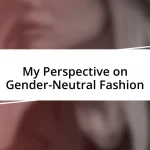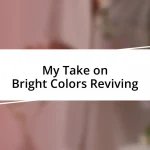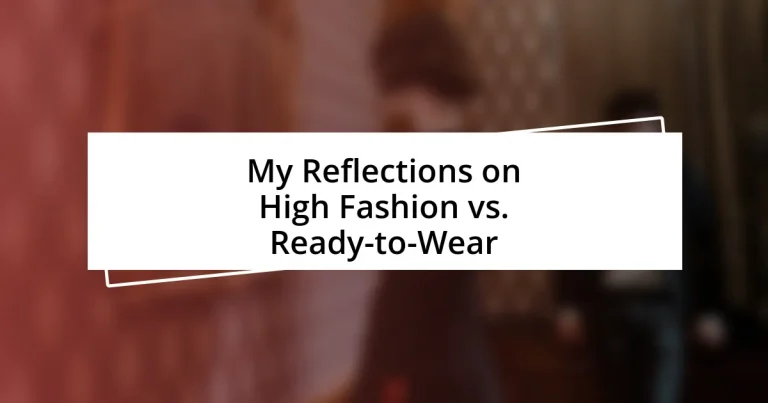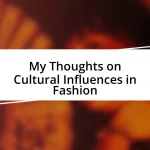Key takeaways:
- High fashion trends often reflect societal shifts and emotional connections, serving as a mirror of our collective psyche.
- Ready-to-wear fashion emphasizes accessibility, versatility, and individuality, allowing for personal expression in everyday life.
- Fashion shows play a critical role in shaping trends and challenging societal norms, sparking conversations about identity and style.
- Combining elements of high fashion with ready-to-wear can enhance personal style, blending elegance with practicality for everyday wear.
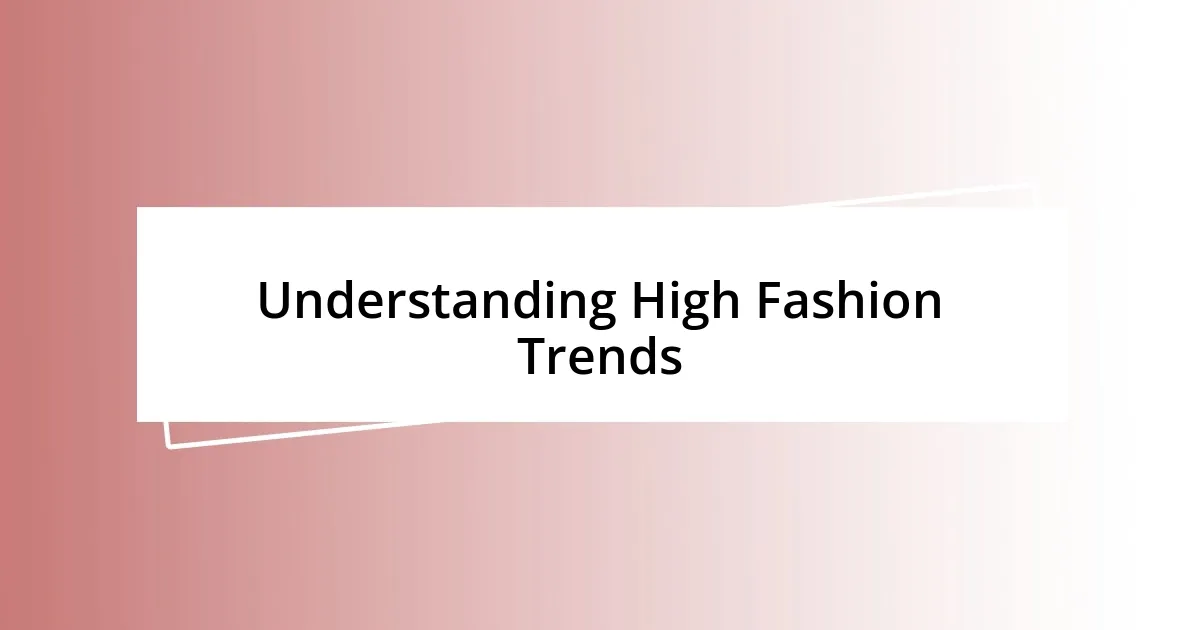
Understanding High Fashion Trends
High fashion trends often emerge from the vibrant intersection of art, culture, and societal shifts. I still remember flipping through Vogue as a teenager, awestruck by the bold designs and creative expressions that demanded attention. Can something so extravagant truly reflect everyday life, or is it simply a world apart?
One fascinating aspect of high fashion is its cyclical nature. Trends can be remarkably ephemeral, yet they often resurface in new forms, inspired by past movements. Reflecting on my own experiences, I’ve seen how a revival, like the 70s bohemian look, can evoke a powerful longing for a simpler time. Isn’t it interesting how fashion can carry emotional weight tied to memories?
Moreover, high fashion isn’t just about the garments; it’s a conversation starter. I once attended a fashion show that left me breathless, not just from the stunning pieces, but from the palpable energy in the room. It struck me that high fashion trends serve as a mirror, illuminating our collective psyche. What do these creations reveal about who we are today?
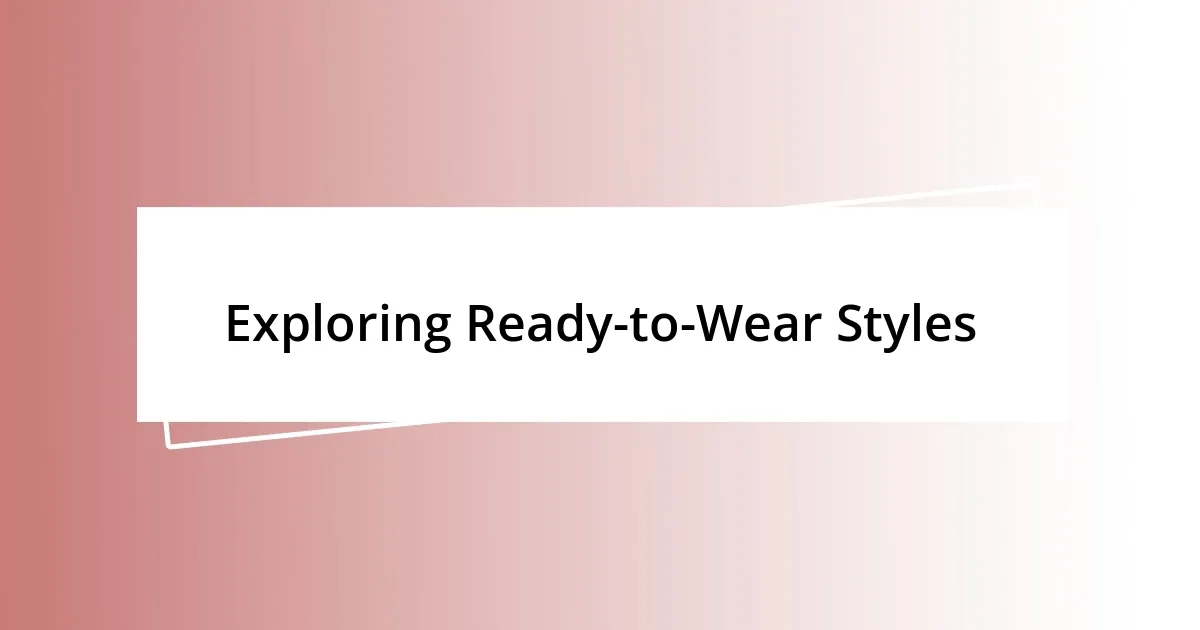
Exploring Ready-to-Wear Styles
Exploring ready-to-wear styles offers a refreshing contrast to the often unattainable visions of high fashion. These collections provide garments that are not only stylish but also practical for everyday wear. I recall my excitement when I discovered a local boutique showcasing a ready-to-wear line that perfectly married comfort and chic design. It felt incredibly liberating to express my style with pieces that were accessible, relatable, and functional.
One notable aspect of ready-to-wear fashion is its adaptability. Unlike high fashion, which often requires meticulous styling and specific occasions, ready-to-wear allows for versatility in how outfits can be mixed and matched. I still smile when I think about that dress I purchased; it became a staple for brunches, casual Fridays at work, and even date nights with just a change of accessories. Isn’t it fascinating how a single piece can fit seamlessly into various aspects of our lives?
Ready-to-wear lines also celebrate individuality through diverse offerings. Designers increasingly cater to a broad range of body types and personal styles, making fashion more inclusive. This inclusivity reminds me of when I attended a street fashion event and saw countless unique styles that inspired me to step outside my comfort zone. I believe that ready-to-wear embodies the spirit of real-life expression, allowing everyone to find pieces that resonate personally.
| Aspect | Ready-to-Wear |
|---|---|
| Accessibility | Widely available and affordable |
| Usage | Suitable for everyday wear |
| Style Range | Diverse styles for various body types |
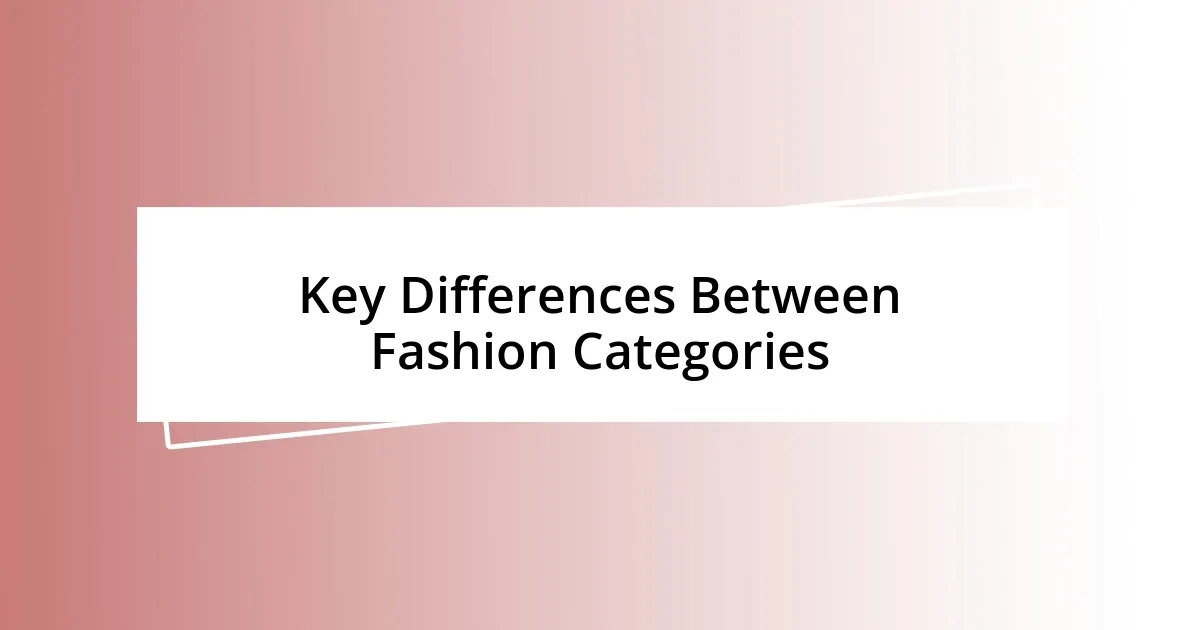
Key Differences Between Fashion Categories
High fashion and ready-to-wear serve distinctly different purposes in the world of fashion, shaped by their accessibility and intended audience. I remember my first high-fashion piece; it was a stunning designer handbag that felt almost like a piece of art. The thrill of owning something so exclusive was exhilarating, yet it’s that thrill which often places high fashion on a pedestal, making it seem distant for most of us. In contrast, ready-to-wear democratizes style, allowing me to purchase a beautiful dress without worrying if it would fit into a niche event.
Here are some key differences to consider:
- Exclusivity: High fashion often limits availability, showcasing collections primarily through runways and exclusive boutiques, whereas ready-to-wear is easily found in stores and online.
- Target Audience: High fashion caters to a luxury market, while ready-to-wear focuses on the everyday consumer seeking style that fits into daily life.
- Price Point: High fashion demands a premium price, reflecting craftsmanship and brand value, while ready-to-wear offers more budget-friendly options that still embrace style.
- Functionality: High fashion pieces may prioritize artistic vision over wearability, whereas ready-to-wear designs emphasize comfort and practicality for everyday settings.
Each category brings its unique allure, whether it’s the fantasy of haute couture or the relatable ease of everyday styles. I often find myself drawn to a balance between the two, constantly exploring how I can incorporate elements of high fashion into my daily look without losing the practicality I value.
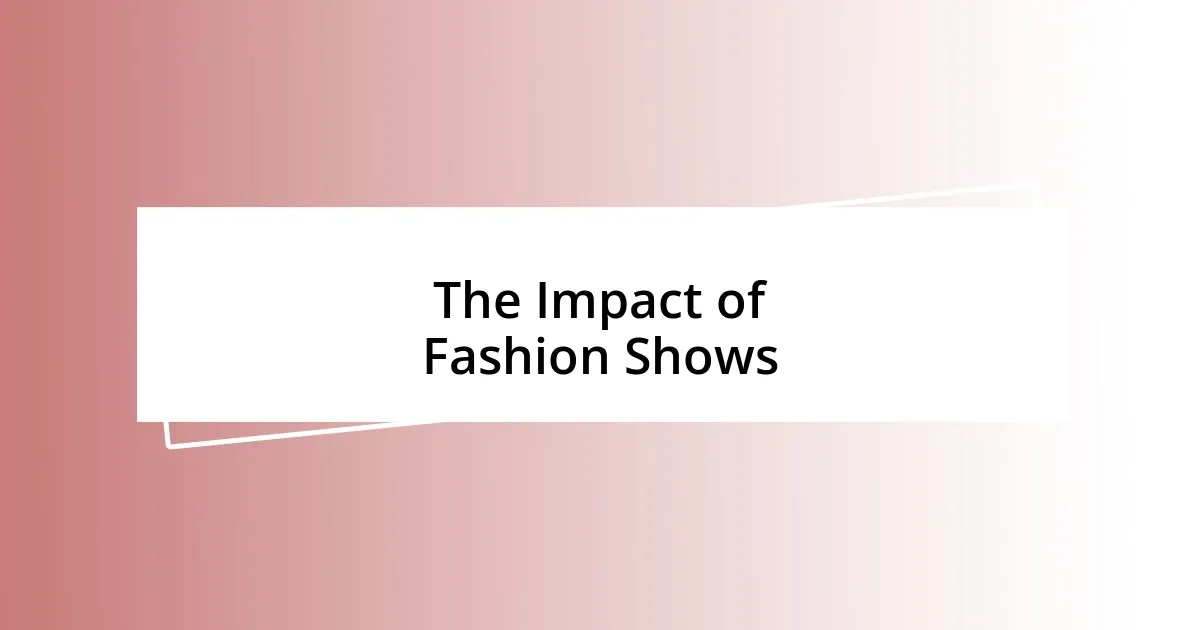
The Impact of Fashion Shows
Fashion shows are pivotal in shaping the narrative of style and trends. I remember attending a local fashion show, where the energy was palpable. The models glided down the runway, embodying not just clothes but ideas. It left me reflecting on how these spectacles not only showcase a designer’s vision but also set the tone for what we’ll see in stores months later.
These events often create a sense of aspiration and anticipation in the fashion world. Take, for example, a particularly bold collection that left viewers gasping in awe. The designs sparked conversations in cafés and on social media, turning runway looks into must-haves for the season. I found myself daydreaming about how to reinterpret those bold pieces into my wardrobe — doesn’t it make you wonder how a single show can influence countless wardrobes?
It’s interesting to think about the cultural significance of fashion shows, too. They often challenge societal norms and push boundaries. I vividly recall a collection that embraced gender fluidity, which resonated deeply with me. It made me question my own fashion choices and how they reflect my identity. These shows have the power to initiate dialogue, urging us to consider not just what we wear, but why we wear it.
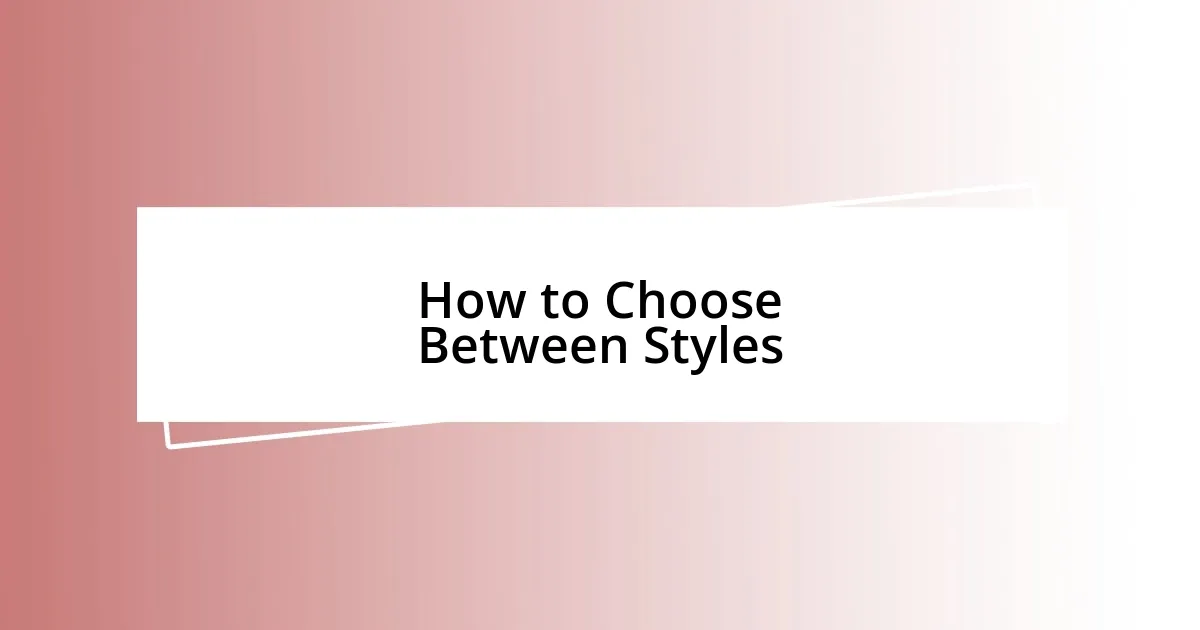
How to Choose Between Styles
When choosing between high fashion and ready-to-wear, I find it helpful to reflect on my lifestyle. For instance, I once attended a gala where I wore a breathtaking high-fashion gown. The experience was magical, but I realized it was an exception. Most days, I yearn for the ease and versatility of ready-to-wear. Does that resonate with you?
Your lifestyle and values should guide your choice. High fashion appeals to those who relish exclusivity and craftsmanship; it’s like owning a piece of art. In contrast, ready-to-wear invites us to express ourselves without the constraints of formality. I remember spotting a chic, everyday outfit that instantly uplifted my mood. It was practical yet stylish, capturing the balance we often seek.
Ultimately, think about how each style makes you feel. Personally, I appreciate how ready-to-wear empowers me to be creative in my everyday choices. High fashion lures me in with its allure, but the comfort of ready-to-wear ensures I’m ready for whatever my day holds. Wouldn’t you agree that fashion should enhance our lives rather than complicate them?
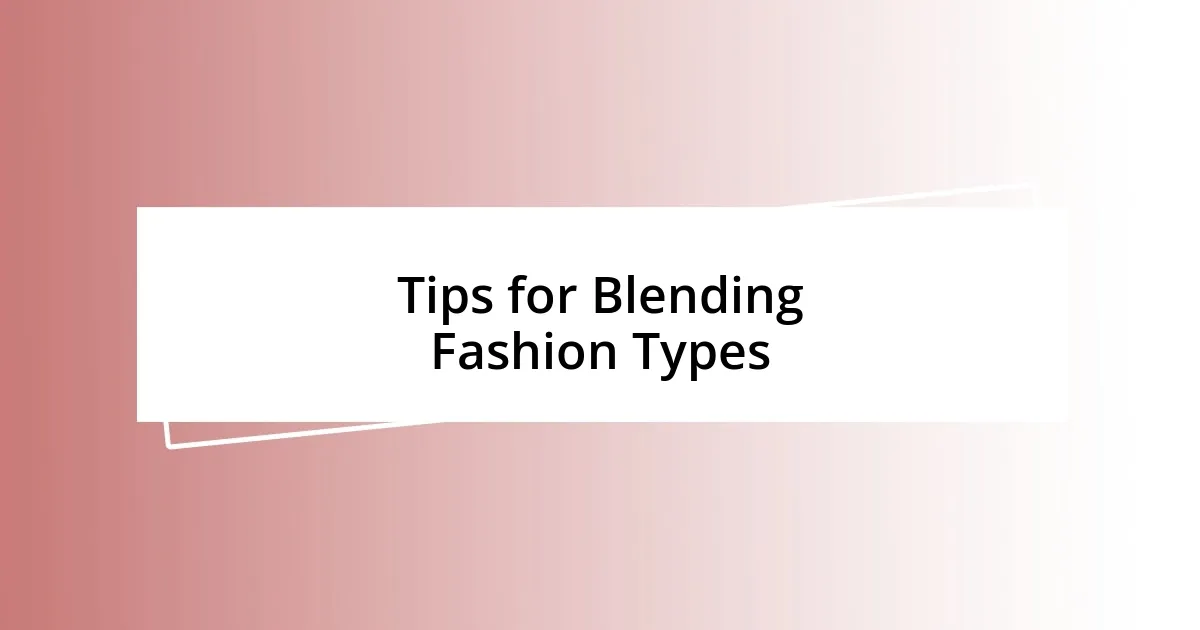
Tips for Blending Fashion Types
Blending high fashion and ready-to-wear can be incredibly rewarding. I remember combining a statement blazer from a high-fashion line with a simple tee and jeans for a night out. The juxtaposition elevated my outfit while keeping it accessible. Wouldn’t it be nice to embrace elegance without sacrificing comfort?
Another effective approach is to select a standout piece from the high-fashion realm and pair it with everyday essentials. I once acquired a stunning pair of avant-garde heels. By styling them with a casual sundress, I created a look that felt both playful and sophisticated. It’s fascinating how just one eye-catching item can transform basic clothing into something special, don’t you think?
Lastly, don’t shy away from experimenting with layering. I love to mix textures, like wearing a tailored high-fashion trench over a cozy knit sweater. It’s a delightful way to play with silhouettes and create depth in your outfit. By merging fashion types, I often find my own style becomes an evolving conversation between elegance and practicality. Have you tried this approach? You might be surprised at how effortlessly they complement each other!
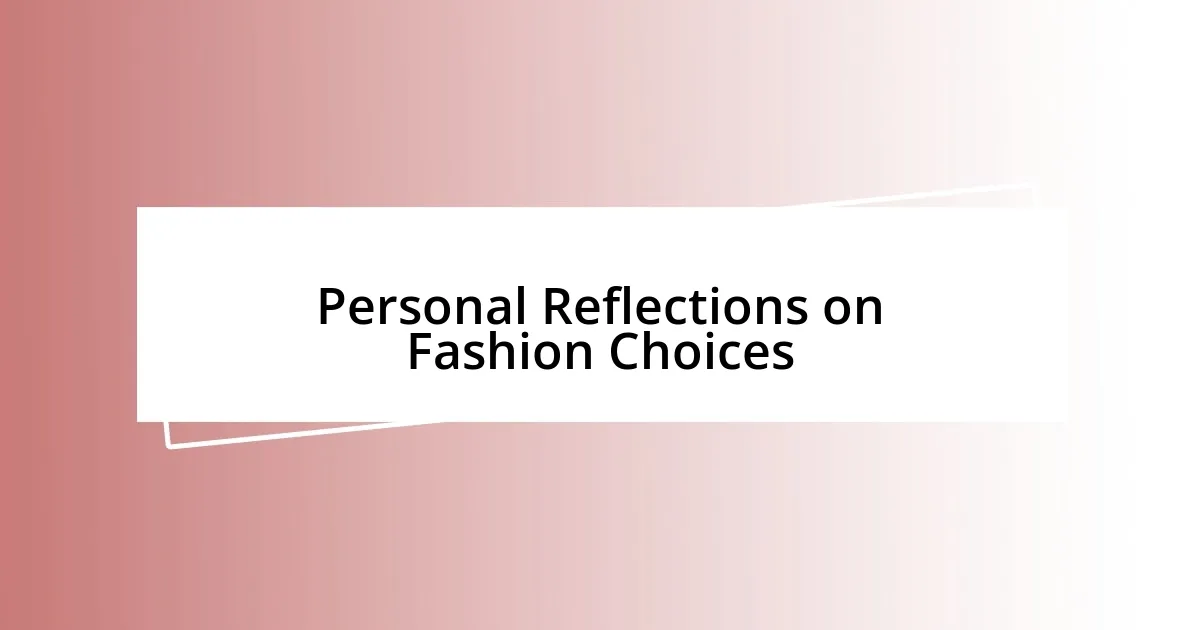
Personal Reflections on Fashion Choices
Fashion choices often mirror our inner feelings and self-perception. I distinctly remember a day when I opted for a vintage-inspired dress that brightened my mood, making me feel as if I had stepped out of a different era. Those moments remind me of how clothing can transform not just our appearance, but our mindset. Have you ever felt that rush of confidence when you wore something that truly resonated with who you are?
One time, I played around with the concept of personal branding through fashion. I wore a structured, tailored suit to a casual lunch with friends, and their positive reactions reminded me that clothing can be a powerful form of expression. It made me realize how the lines between high fashion and ready-to-wear blur, crafting a narrative that speaks volumes about our choices. Isn’t it intriguing how a simple outfit can reflect not just our taste, but also our aspirations?
In reflecting on my fashion decisions, I’ve learned the importance of comfort and authenticity. I often choose pieces that feel like extensions of my personality, which occasionally leads me to unexpected combinations. For instance, I once paired a luxurious silk blouse with my favorite joggers. The blend challenged norms, yet it felt undeniably “me.” What do you think—shouldn’t our fashion choices ultimately celebrate our individuality rather than conform to trends?





